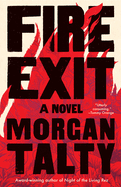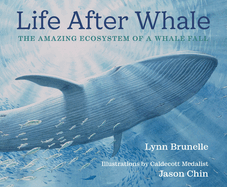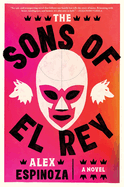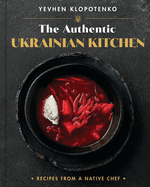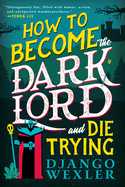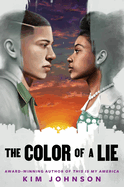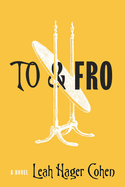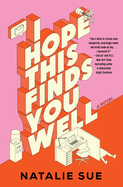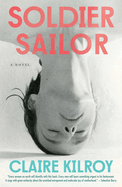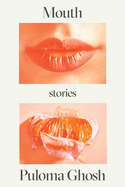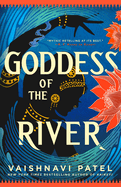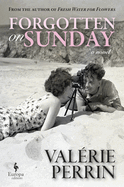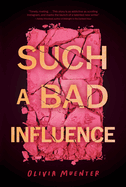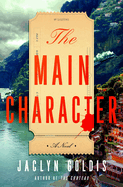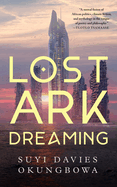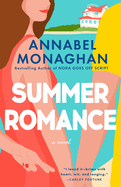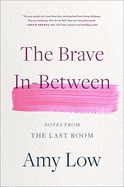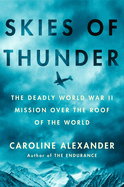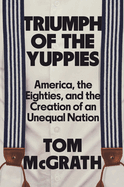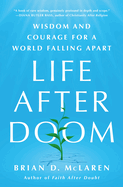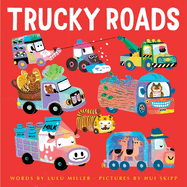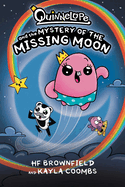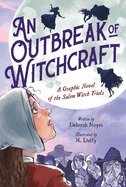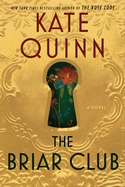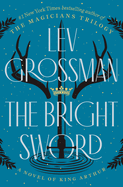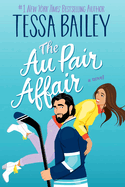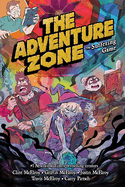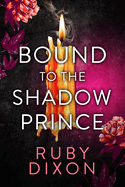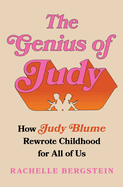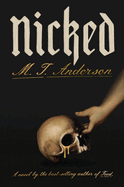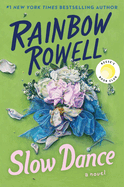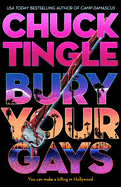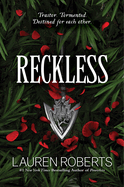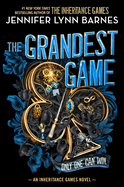Friday, June 14, 2024
This week we feature dynamite fiction like Fire Exit by Morgan Talty, with "tersely poetic, descriptive prose" about a family on the Penobscot reservation grappling with issues of "love and responsibility; blood, culture, and belonging"; and The Sons of El Rey by Alex Espinoza, which takes a "tender and revelatory" look at a family's passion for lucha libre and the "ripple effects of toxic masculinity, racism, and unspoken truths"; as well as nonfiction like The Brave In-Between by Amy Low, a cancer memoir characterized by "humor, grace, and plenty of grit." Plus, Life After Whale: The Amazing Ecosystem of a Whale Fall is a "stunning" picture book by Lynn Brunelle and illustrated by Jason Chin, "an exquisite ode to the largest documented animal on Earth"; and The Color of a Lie by Kim Johnson is "a stellar and arresting YA thriller inspired by real-life events during the civil rights movement."
In The Writer's Life, Annabel Monaghan digs into the inspiration for her latest novel, about a single mother swept away by summer romance while struggling to balance parenthood, divorce, and the death of a loved one.
Fire Exit
by Morgan Talty
Stark and tender, Fire Exit by Morgan Talty (Night of the Living Rez) compassionately addresses tough choices in matters of family and love. In hardscrabble circumstances, surrounded by poverty, alcoholism, and family violence, one man wishes to give his daughter a meaningful gift: the truth.
Charles Lamosway has grown up on the Penobscot reservation in Maine, but doesn't have Native American blood. Although he's very close to his Native stepfather, Frederick, his biological parentage meant he had to move off the reservation when he came of age. Frederick purchased land and helped to build the house where Charles lives now, just across the river. Largely isolated, with few friends, Charles watches from his porch the family on the other side: Mary, Roger, and their daughter, Elizabeth. Charles is Elizabeth's biological father, a secret he has kept at Mary's request. But as he ages, and as his mother Louise's health worsens, he feels increasingly that Elizabeth, now an adult, must know the truth. This urge becomes a fixation, a bodily need. Elizabeth faces medical problems, and he is convinced she needs the truth--including Louise's medical history--to survive. But it's possible that what Charles sees as necessary will have an entirely different outcome from what he intends.
Fire Exit is concerned with bodies, with visceral needs not only for food and shelter but for truth. Talty's tersely poetic, descriptive prose grounds this story in the physical. This first novel grapples with family issues and hard choices about love and responsibility; blood, culture, and belonging. It is an utterly absorbing story, always firmly rooted in the corporeal; tough, honest, but not bitter. --Julia Kastner, librarian and blogger at pagesofjulia
Discover: On the boundary of Maine's Penobscot reservation, a solitary man wrestles with questions of truth, family history, and what is owed to the next generation.
The Sons of El Rey
by Alex Espinoza
The tender and revelatory family drama The Sons of El Rey by Alex Espinoza (The Five Acts of Diego León) follows three generations of Mexican-American men as their passion for lucha libre sustains them through immigration, loss, and secret heartache.
In the 1960s, Ernesto Vega moves to Mexico City where he becomes the successful luchador El Rey Coyote, immersed in a world of battle and pageantry that embraces a performative version of queerness in a society shrouded by homophobia. His forbidden love for his best friend overshadows his fame and marriage, although he cannot make the relationship public without destroying his reputation. Decades later, in 2020, Ernesto is now an old man dying in the hospital and his son Freddy struggles with the pandemic-mandated closure of the family gym Ernesto founded 40 years ago after emigrating to Los Angeles. Freddy's son Julian is frustrated by his father's macho reluctance to accept his help or emotional support. Julian's financial struggles following grad school lead him into high-end sex work, in which he finds himself playing out a client's reductive fantasies about Mexican-American men.
Espinoza draws readers into the ripple effects of toxic masculinity, racism, and unspoken truths as the Vega men fight in succession to reconcile their inner lives with societal expectations of their identities with varying degrees of success. Espinoza's prose hits with raw emotional power, illuminating the ways in which "[t]he hurt is what shapes us." This saga of fathers and sons, literal and metaphorical masks, and the American dream spans several turbulent decades and highlights the need for each generation to keep moving forward and keep fighting. --Jaclyn Fulwood, blogger at Infinite Reads
Discover: Three generations of Mexican American men grapple with masculinity, identity, and their family's legacy in the lucha libre world.
To & Fro
by Leah Hager Cohen
Dual young protagonists search for life's meaning in a delightful and unconventionally designed novel that can be read by beginning on either the last or the first page, depending on how readers approach its flip-book format. To & Fro, Leah Hager Cohen's 12th book, follows Ani, who is traveling with a kitten in an unspecified time and place, and Annamae, who is growing up in 21st-century Manhattan.
Cohen (No Book but the World) mirrors Ani's and Annamae's narratives in sometimes obvious and sometimes subtle ways, prompting countless "aha!" moments as parallels surface. Annamae longs to find a perfect friend. "It was as if she'd peeked ahead in a book about herself" and found "a definite clue that such friendship was real, and awaited her." Ani's story is a parable, but her quest is literal; a plucky orphan, she acknowledges that she is "lonesome" and wanders the land in search of a place called Tewanfrough.
Annamae, "serious to a fault," has a more secure childhood; she delights in a list of nautical terminology, "a feast of unknown words and terms," and her conversations with her linguist mother and Harriett, a patient rabbi, burst with wordplay and debates. Meanwhile, Ani also becomes captivated by language; taken in by a community of scholars, she thinks that "if speech were visible" it would be "a great pinwheel of colored streamers... spinning round and round."
To & Fro is a magical celebration of language, stories, and youthful curiosity. Embracing its carefully crafted format of separate, parallel tales will enhance readers' delight as they join Ani and Annamae on their journeys. --Cheryl McKeon, Book House of Stuyvesant Plaza, Albany, N.Y.
Discover: This flip-book novel of two girls' parallel stories in separate worlds is a delightful tribute to language and the quest for life's truths.
I Hope This Finds You Well
by Natalie Sue
Anyone who's ever worked in an office will appreciate Natalie Sue's hilarious satire of workplace mind games in her debut novel, I Hope This Finds You Well. Sue is a keen anthropologist of the despairs of the office worker and is also adept at rendering tricky family dynamics.
The reluctant star of I Hope This Finds You Well is Jolene, a perceptive, sarcastic Iranian Canadian who lives in Calgary. When one of the snarky messages she appends to e-mails at her boring-but-necessary job is discovered, she's put on a training plan administered by the new HR guy, Cliff, a cute, friendly goof. Jolene's already a miserable loner at work due to misunderstandings and untreated anxiety--getting in trouble makes it excruciatingly worse.
Unfortunately, Jolene has no one to confide in. Her life outside the office is just as lonely, a fact she tries to hide from her parents, especially her delightfully pushy Iranian immigrant mother who tries to play matchmaker. Jolene's not interested in love; she's too busy dealing with shame and trauma from a life-changing high school incident that continues to haunt her. However, Jolene's situation takes a turn when her computer suddenly grants her access to all company e-mails and instant messages. Being privy to all the gossip and posturing among her coworkers spurs her into action, and she decides to best her office rival, befriend Cliff, and snag an open promotion.
Despite her novel's comedic billing, Sue avoids clichés and stock characters, instead building layered portrayals of even the villains. Prepare to feel excruciating secondhand embarrassment but also hope, grief, joy, and so much more. --Nina Semczuk, writer, editor, and illustrator
Discover: I Hope This Finds You Well is a deeply felt workplace comedy that leaves readers feeling not only satisfied but also emotionally moved.
Soldier Sailor
by Claire Kilroy
Claire Kilroy (The Devil I Know) explores the highest highs and lowest lows of motherhood in Soldier Sailor, a searing portrait of the early years of parenting written as a kind of confessional from an unnamed mother to her son.
"I hadn't had an unbroken night's sleep since you'd exploded onto the scene--I love you, but Jesus wept," she says. Within the sleeplessness, she finds a love for her child she never thought possible, but also a deep-seated rage: at her husband and the patriarchy, at the failure of community to care for young mothers, at the impossibility of motherhood, the tedium and the joy of it all as she slides into something akin to insanity. Kilroy's incredible novel candidly explores the tiresome and infuriating reality of mothering a small child. The mother wonders how and when she became this spiteful version of herself. And yet Soldier Sailor itself never comes off as bitter, as Kilroy beautifully brings the novel back time and again to the desperate love this mother has for her exasperating, exhausting, perfect child. "Loving you was the easy part. Loving you was the only easy part."
In finding that balance, Kilroy succeeds in offering readers a glimpse into motherhood that feels as primal as it is poetic, a brilliant reflection of how impossibly enormous all emotions become in the transition into motherhood. Raw and honest, Soldier Sailor will leave readers--and especially those who are mothers themselves--white-knuckled at the end of an emotional roller-coaster of anguish and joy alike that perfectly encapsulates the extremes of becoming a parent. --Kerry McHugh
Discover: This searing and candid exploration of the extremes of early parenthood captures a mother's rage, joy, anguish and love as she mourns the loss of the woman she was before having a child.
Mouth: Stories
by Puloma Ghosh
Mouth, Puloma Ghosh's debut, is a collection of 11 sometimes surreal, sometimes horrifying, always startling short stories. Grappling with themes of female bodily autonomy, the connection between sexuality and death, and the haunting influence of grief, these stories will unsettle and fascinate in equal measure.
In "Desiccation," a teen girl develops a sexual fantasy about the only other Indian girl at her local ice rink, Pritha, whom she thinks is a vampire. Linked notions of grief and sexuality persist in "In the Winter," a flash piece about a woman's raw sexual encounters in college. Meanwhile, "Nip" is told from the perspective of a woman's favorite perfume, already aching from the loss of her lover's skin, and "Natalya" chillingly unspools the truth behind one woman's death through the perspective of her ex-lover's systematic autopsy of her corpse.
In these stories, Ghosh's visceral descriptions make the abstractions of desire and rage elusive, slippery as scent or blood between fingers. Like K-Ming Chang's carnal prose, Ghosh's delights in even the grotesque sides of sex and rebirth. But while her stories often include substantial violence, their climaxes focus more on transcendent, existential questions. The uncanny sense of some parallel, negative space, waiting to entrap someone or swallow them whole arises in "Lemon Boy." A girl who already feels alienated from her post-college life meets an enigmatic boy who awakens her awareness to black holes that follow him "like some kind of all-invasive flora" and constantly threaten to consume him. Like the story the Lemon Boy tells, Ghosh's stories awaken readers to the gaping presence of their own insatiable hungers. --Alice Martin, freelance writer and editor
Discover: A collection of creepy and surreal stories, Mouth introduces readers to Puloma Ghosh's unmatched ability to probe the visceral depths of female pain, desire, and grief.
Goddess of the River
by Vaishnavi Patel
Vaishnavi Patel (Kaikeyi) tells the story of the Mahabharata through the dual perspectives of the goddess Ganga and her son Bhishma in Goddess of the River. The goddess Ganga--who appears only briefly at the beginning of the source text--remains an important character throughout this moving novel, which touches on themes of motherhood, love, duty, justice, pain, grief, guilt, and causality.
The narrative begins with Ganga's arrival on Earth in response to humanity's prayers, followed by her binding when other gods fear her "unbridled spirit"; her gradual appreciation of Earth's natural beauty and the godlings who care for it; and her horror at humanity's destruction of Earth. After a vengeful human curses Ganga and her beloved godlings to mortal form as mother and children, Ganga releases seven godlings by drowning them moments after birth, but her husband, the raja of Hastinapur, prevents her from killing her eighth godling child, who becomes Bhishma. Bhishma misunderstands Ganga's instructions, which were intended to save him from committing human crimes whose weight he would bear when returned to godling form, and he honors his oaths even when doing so negates the righteous choice. As a result, disputes about the rightful heir fester over two generations, and Hastinapur hurtles toward a "war to end all wars" between cousins. Humans grapple with the meanings of dharma and righteousness, and Ganga's stance on humanity softens as she begins to understand the complexity of the human condition.
Patel's lyrical style, especially in Ganga's voice, remains even through blood-soaked battle scenes, keeping the focus on ideas about the long sweep of history, both of humanity and the world. --Dainy Bernstein, freelance reviewer
Discover: A mother's hope for her son's righteousness dominates in Goddess of the River, Vaishnavi Patel's emotional retelling of the Mahabharata from the perspectives of Ganga and Bhishma.
Forgotten on Sunday
by Valérie Perrin, transl. by Hildegarde Serle
An unlikely friendship is forged between two women born generations apart in Forgotten on Sunday, a profound, emotionally complex novel written by Valérie Perrin and translated from the French by Hildegard Serle.
For years, 21-year-old Justine Neige has lived in Milly, a small French village, while happily working as a nursing assistant at the Hydrangeas, the local retirement home. There, Justine is most intrigued by Hélène, an enigmatic, 96-year-old nicknamed "The Beach Lady." Drawn to Hélène and her stories, Justine willingly collects and records her remembrances in a notebook at the behest of Hélène's grandson. In doing so, Justine uncovers details of Hélène's long, fascinating life that include romantic passions; a bistro job where she catered to the poet Baudelaire; and the harrowing atrocities of World War II. These incredibly moving stories of love, loss, and forgiveness awaken Justine's desires: "I feel nostalgic, nostalgic for what I've not yet lived." These feelings deepen when anonymous, mysterious phone calls are made from the Hydrangeas that falsely notify relatives that their loved ones have died. The contacts have either forgotten or refuse to keep in touch with the geriatrics; the calls finally force folks to visit. As a police investigation ensues, Justine probes the history of her own family--and questions are suddenly raised regarding the long-ago tragic car accident that claimed her parents' lives.
Perrin (Fresh Water for Flowers) skillfully juggles the storylines of Justine and Hélène, heightening the drama of each with unexpected revelations. Delicate plot points--infused with elements of historical fiction juxtaposed against contemporary themes--will keep readers charmed and deeply engrossed. --Kathleen Gerard, blogger at Reading Between the Lines
Discover: An emotionally engrossing novel that exposes the ways losses sustained by two French women, born generations apart, come to define their lives.
Mystery & Thriller
Such a Bad Influence
by Olivia Muenter
A wicked debut with a twist to make readers' heads spin, Olivia Muenter's Such a Bad Influence strikes at the unsteady scaffolding of the influencer economy, where personalities--and entire childhoods--are optimized for the algorithmic gold rush.
In the book's opening pages, Evelyn "Evie" Davis, one of the world's most-followed social media influencers who has been a walking, talking brand since she was a kid, launches an Instagram Live from the front seat of her car. That's nothing out of the ordinary for such an in-demand creator, but when the broadcast cuts out suddenly and Evie vanishes, it's her much older (and much less online) sister, Hazel, who suspects foul play. Hazel is convinced that she--and only she--really understands her little sister, who's been a pawn in their mother's financial machinations for years. And so begins Hazel's desperate bid to uncover what has really become of Evie, with or without police cooperation. But doing so will require Hazel to dig into the history of @evelyn, and that story is far more complicated than Hazel ever wanted to imagine. Using snippets of text threads, Reddit forums, newsletter archives, and podcast transcripts to accompany Hazel's first-person narrative, Muenter builds an of-the-moment read that avoids becoming on the nose. With Such a Bad Influence, the writer and Bad on Paper podcast cohost makes a compelling case for why we can never really know someone--even, and perhaps especially, those whom we most yearn to know. --Lauren Puckett-Pope
Discover: This wicked, compelling debut about a missing social media influencer and the older sister who is desperate to find her is an of-the-moment read that avoids becoming on the nose.
The Main Character
by Jaclyn Goldis
In The Main Character, a clever but at times uneven homage to Agatha Christie, Jaclyn Goldis explores the unusual strategy her bestselling mystery author, Ginevra Ex, devises to shape the protagonists of her own novels.
Instead of using only her imagination, Ginevra finds ordinary people from whom she can build a character and asks them increasingly personal questions, followed by an investigation by a private detective. In exchange for their life's story and the invasion of their privacy, the subjects receive $100,000, plus infamy in one of Ginevra's novels. Former news anchor Rory Aronov is "Ginevra's latest, and finest, main character," and the author gives her a bonus: a luxury suite on the Venice Simplon-Orient-Express for a journey across Italy. For Rory, the train conjures the "most glamorous Agatha Christie novel. A place inexplicably of both fun and murder." But her excitement becomes puzzlement when the passengers include her brother, her ex-fiancé, her best friend, and a former lover who is also Ginevra's attorney. Each of them receives a copy of Ginevra's unpublished manuscript, which exposes their secrets. The manuscripts' disappearance is only one mystery the train holds.
Ginevra's devious plotting manipulates Rory and company as if they were her creations. But a tangential story line delving into Ginevra's past takes the plot off the rails until Goldis brings her clever idea back on track. The Main Character gains its strength by concentrating on the characters' interactions as this Christie tribute puts a new spin on the locked-room mystery. --Oline H. Cogdill, freelance reviewer
Discover: An author who bases her characters on ordinary people treats her latest subject to a trip on the Orient Express with people from the subject's past in this deviously clever mystery.
Bright and Tender Dark
by Joanna Pearson
Joanna Pearson's intricate debut novel, Bright and Tender Dark, nimbly ties in true-crime tropes as it traces the ripple effects of a college student's murder in 2000.
Karlie Richards, a popular 19-year-old University of North Carolina freshman, was a leader in the campus evangelical group. When she was found strangled to death in her apartment, Toby Braithwaite, an intellectually disabled man who worked at a local diner and had a crush on Karlie, was arrested. He's jailed for the crime, though he's widely believed to be innocent.
The framing story, set two decades later, in 2019, has Karlie's freshman roommate, Joy Brunner, finding an unopened letter from Karlie addressed to her in an old book. The amateur investigation spurred by the letter turns into a writing project that offers Joy fresh purpose, but Joy's obsession endangers her mental health.
Multiple, often unexpected third-person limited perspectives contribute vital clues, although they threaten to overcomplicate the narrative. Pearson contrasts 1999 and 2019 via documents that include newspaper articles and Reddit threads, portraying the dangers of the social media era through a vicious online debate and an incriminating viral video.
Religion takes on major significance here. The title's oxymoron juxtaposes light and dark, good versus evil, but the situation is subtler. Ambivalence reigns: Joy is a missionary's daughter whose father's advancing illness eroded her faith; Karlie questioned everything; another character escapes a cult. It all makes for a convincing--if bleak--post-religious landscape, but Bright and Tender Dark's many facets mesh satisfyingly by the end. This is a perfect choice for true-crime readers of I Have Some Questions for You and My Dark Vanessa. --Rebecca Foster, freelance reviewer, proofreader and blogger at Bookish Beck
Discover: Joanna Pearson's multi-perspective debut novel comments on toxic religion and true-crime enthusiasm as it chronicles the search for justice for a murdered college freshman.
Science Fiction & Fantasy
How to Become the Dark Lord and Die Trying
by Django Wexler
In How to Become the Dark Lord and Die Trying, the first entry in a planned series, Django Wexler (Ashes of the Sun) introduces a sarcastic, punchy heroine. Davi is done with dying and starting over in a world that has kept her in a time loop for a thousand years, ever since she woke up from her life on Earth and was greeted by a wizard who told her she's the destined savior of the Kingdom. In her 238th life, she decides to become the Dark Lord herself. She starts by gathering a horde of minions from among the wilders, non-human beings who serve the Dark Lord and have been her enemies for the past thousand years.
Davi's first-person narration is electric, filled with obscenities and hilarities, as when she describes her method of killing the wizard as having "enmushified his head." She addresses readers within the narrative and in footnotes, providing context and making groan-worthy jokes, mostly sexual. But the novel is not all killing, sex, and jokes. As her quest progresses, Davi ponders the ethics of others dying for her, even if everything (including their lives) will just reset when she dies again. She's surprised by the loyalty some wilders develop for her but also begins to form feelings for them--one in particular. She acknowledges that her situation sounds like a video game or RPG, but she hasn't figured out the rules of this world. In choosing villainy over heroism, Davi may be getting closer to answers, but she might not like them.
Davi's questionable ethics, active libido, comfortable bisexuality, and leadership skills combine for a fresh and exciting take on the fantasy adventure. --Dainy Bernstein, freelance reviewer
Discover: How to Become the Dark Lord and Die Trying is the hilarious and exciting story of a sarcastic heroine turned villain on a wild quest to escape a time loop.
Lost Ark Dreaming
by Suyi Davies Okungbowa
Lost Ark Dreaming is an immersive speculative novella by Nigerian-born author Suyi Davies Okungbowa (Son of the Storm). Its intriguing characters navigate a brutal class system, organized into levels of a partially submerged megatower in Lagos. The novella is detailed and complex enough to be worth reading just for the world itself.
But Lost Ark Dreaming has much more to recommend it beyond fantastic world-building. Of its three main characters, Yekini particularly shines as a lovable grouch who just wants to care for her grandmother and keep her nose clean at work. But she gets into exactly the kind of trouble she's been trying so hard to avoid when she is assigned to fix a mysterious leak in the submerged levels of the tower.
Okungbowa blends a post-climate collapse, drowned-world setting with fantastical tropes. He intersperses epistolary elements (a combination of documentation, poetry, and folklore) throughout and ultimately engages with a deep and powerful thread of real history. His writing is thoughtful and peppered with gorgeous lines, such as "the weight of grief is not a weight for bodies." Water is a poignant presence and metaphor; that the poorest people in this society are literally submerged below the waterline is an especially resonant example.
For fans of genre benders, dystopia, and stories of great humanity, Lost Ark Dreaming is a feast of meaning. The novella may be short, but Okungbowa achieves a feat of compression. Readers will be drawn into a fast-paced story set in an intensely imagined world of science, spirits, and poetry. --Carol Caley, writer
Discover: This immersive speculative novella set in a partially submerged tower in post-climate collapse Lagos brings to life a detailed world, a fast-paced plot, and engaging characters.
Romance
Savor It
by Tarah DeWitt
In Tarah DeWitt's Savor It, a disgraced chef and a schoolteacher spend a summer teaching each other to enjoy the little things. With humor, simmering tension and steady character development, this small-town romance is a feast for the senses and a balm for world-weary souls.
Fisher Lange was once a culinary rockstar with three Michelin stars. But his passion waned and then his sister died in a car crash, leading to a public blowup and his firing. His former boss gives him one last chance: go to Spunes, Ore., and get her new restaurant ready for the incoming head chef. After having dodged his guardian responsibilities for three years, Fisher takes his teenage niece to Spunes for a fresh start. The small town proves exactly what they both need--a chance to breathe and connect with each other.
Schoolteacher and amateur flower farmer Sage Byrd is a small-town girl. She loves the supportive community of Spunes and doesn't dream of leaving. And she refuses to be labeled as unambitious or somehow lesser because she's happy this way.
When Fisher moves in next door for the summer, the two fall into a sweet, sexy, short-term romance. Growing closer is bittersweet. How can they follow their hearts and stay true to themselves when they know Fisher will leave soon?
As Sage and Fisher linger over the feel of water on their skin, the vibrant beauty of a late-summer dahlia, and the decadence of a simple, perfect scone, readers will be inspired to slow down and savor it. --Suzanne Krohn, librarian and freelance reviewer
Discover: This small-town summer romance is a feast for the senses and a balm for world-weary souls.
Summer Romance
by Annabel Monaghan
Annabel Monaghan's warm-hearted third novel for adults, Summer Romance, explores one woman's quest to reclaim her life after cataclysmic grief, and the risks she takes in opening her heart again.
Professional organizer Ali Morris has operated on autopilot, slopping around in sweats, since her mom died and her husband, Pete, moved out. But when Pete finally tells her he wants a divorce, something in Ali wakes up. Digging through her wardrobe for pants with actual hardware, she heads to the dog park and immediately meets Ethan, a handsome lawyer. But their seemingly no-strings-attached summer romance will have far-reaching consequences, both for Ali's love life and her dormant sense of self.
Monaghan (Nora Goes Off Script; Same Time Next Summer) creates a breezy narrative that combines witty asides (including Ali's one-sided conversations with her mother) with the nuts-and-bolts struggles of single parenting, including a frantic search for a lost soccer jersey and deep existential loneliness. Ali can organize other people's closets or spice cabinets, but facing her own insecurities and taking charge of her future proves harder. The contrast between Ali's decision to build an adult life in the town where she grew up and Ethan's choice to establish himself elsewhere helps ramp up the tension of their relationship. As Ali begins to fully inhabit her days (and her non-sweatpants wardrobe) again, she must decide if it's worth extending that summer fling into an uncertain--but attractive--future.
Bittersweet and often wryly funny, Summer Romance is an appealing mix of starry-eyed romantic moments, quirky local characters, and reflections on moving forward after loss. --Katie Noah Gibson, blogger at Cakes, Tea and Dreams
Discover: Annabel Monaghan's breezy third novel follows a single mom on a lighthearted summer fling that may prove to be anything but.
Food & Wine
The Authentic Ukrainian Kitchen: Recipes from a Native Chef
by Yevhen Klopotenko
Activism can start in the kitchen--or at least that's what it feels like when reading The Authentic Ukrainian Kitchen: Recipes from a Native Chef, a cookbook by one of Ukraine's most popular chefs. Yevhen Klopotenko, who counts restaurateur and school-lunch reformer among his many pursuits, repudiates a bland, Soviet-imposed food culture and heralds Ukraine's ethnic dishes as worthy of kitchens around the world. "After all," he writes, "if you want to learn about a culture, what better way than to try its dishes?" The chef doesn't shy away from mentioning the Russia-Ukraine war. In fact, the book's very first recipe includes modifications needed in 2022 when Ukrainian grocery stores ran out of yeast.
The robust cookbook proudly dives into the history of staples such as rye flour and cheeses. However, Klopotenko informs readers in his casual, friendly style when the historical record is sparse, such as how buckwheat first arrived in Ukraine. The book sorts its recipes into eight sections; each recipe generally fills an entire page, with accompanying photographs claiming full pages of their own. Fans of Olia Hercules's Mamushka will recognize a similar aesthetic in this book's food styling and plating. But while Hercules leans toward memoir in her recipe introductions, Klopotenko relies on research and his travels to provide context.
While the recipes are mostly current and rediscovered Ukrainian classics, Klopotenko adds his own twists here and there, such as adding fennel seeds to black currant liqueur, or adding honey and smoked paprika to uzvar, another quintessential drink. --Nina Semczuk, writer, editor, and illustrator
Discover: Popular Ukrainian chef Yevhen Klopotenko's cookbook is a delightful compendium of Ukrainian cuisine, updated for modern cooking techniques and palates.
Biography & Memoir
The Brave In-Between: Notes from the Last Room
by Amy Low
Amy Low's thoughtful memoir, The Brave In-Between, details her attempts to live with courage and compassion after receiving a stage IV colon cancer diagnosis, on top of her divorce. Low invites readers into "the last room" of life, sharing her struggles and triumphs (and some deceptively "normal" days) along her cancer journey.
She begins her narrative with "an awful ending": the dissolution of her marriage to Don, the father of her two children. In 2019, several years into single parenthood, with Don living several hours away, Low went to see her doctor about some symptoms she couldn't shake. After a series of increasingly worrying tests, Low's medical team found a sizable mass on her liver--a diagnosis that sent her down a path she could never have imagined.
As she details her chemo treatment; her cycle of surgeries and recoveries; and her emotional swings from acceptance to anger to overwhelming grief, Low frames her experience around St. Paul's exhortation in Philippians, chapter 4, verse 8: "Whatever is true, whatever is noble, whatever is right, whatever is pure, whatever is lovely, whatever is admirable--if anything is excellent or praiseworthy, think on these things." Low sees this as "the map for the most bewildering corners" of her last room, as she navigates the "constant tension between the art of living fully and the discipline of waiting well."
Her memoir emphasizes the beauty, wisdom, and even joy she found along the way. With humor, grace, and plenty of grit, Low lives as fully as she can in the last room, knowing her time there is limited--but remaining open to what the room can teach her. --Katie Noah Gibson
Discover: Frank and straightforward, Low's memoir focuses on virtues from the Apostle Paul to see "new contours of beauty" even as her cancer progresses.
History
Skies of Thunder: The Deadly World War II Mission over the Roof of the World
by Caroline Alexander
The often overlooked and extremely chaotic China-Burma-India (CBI) theater of operations in World War II receives long-overdue treatment in Skies of Thunder by bestselling historian Caroline Alexander (The Endurance). When Japan's armies burst into Burma (now Myanmar) in 1942, they seized the only ground route from India to China. U.S. President Franklin D. Roosevelt, eager "to keep China in the war," ordered a ferry operation to fly thousands of tons of supplies and weapons over the Himalayas to China's nationalist leader (and demanding ally), Chiang Kai-shek. The aerial route from India to China confronted the most experienced pilots with two critical threats: the dangerous terrain known as "the Hump" and often violent weather.
Alexander relies on memoirs, pilot records, and crash logs to recount a bevy of blood-chilling horror stories, as well as the psychological deterioration of those who "flew in fear." This unique condition even had its own diagnosis among airmen: "Humpitis." Alexander also goes beyond the pilots' stories to set the Hump operation against the broader American political and military goals of the CBI theater, including an elegantly encapsulated account of the second Burma campaign of 1944. She cuts through the confusing command structure that overlapped between American, British, and Chinese forces and draws vivid portraits of its (often) prickly personalities, offering an especially insouciant analysis of American General Joseph "Vinegar Joe" Stilwell, whose "pathological loathing of the British" made military success nearly impossible. In Skies of Thunder, Alexander wrangles multiple strands into a seamless and illuminating piece of modern war history. --Peggy Kurkowski, book reviewer and copywriter in Denver
Discover: The daring, harrowing aerial operation to keep China in World War II touches the skies in this brilliant account of a forgotten theater of operations and the pilots who risked it all.
Political Science
Triumph of the Yuppies: America, the Eighties, and the Creation of an Unequal Nation
by Tom McGrath
For anyone old enough to remember the 1980s, the term "young urban professional" and its shorthand "Yuppie" may conjure up a prototypical BMW-driving, suspenders-wearing investment banker who personified the notion of a certain kind of frenetic careerist striving. But as former Philadelphia magazine editor-in-chief Tom McGrath explains in his lively popular history Triumph of the Yuppies, the short-lived flourishing of this archetype signaled more than a passing assortment of fads.
In the 1970s, the postwar consensus built around rising living standards and the projection of international power by the United States began to crumble under the weight of long lines at the gas pump, stagflation, and foreign debacles like the 1979 Iran hostage crisis that doomed Jimmy Carter's presidency. McGrath contends the country was launched irrevocably on the path of increasing economic stratification. Yuppies--highly educated and pouring into knowledge-driven professions like finance and law--were determined to be among the "haves" in what they saw as a zero-sum game.
McGrath neatly integrates his comprehensive research with brief, magazine-style profiles of well-known characters of the era including 1960s antiwar activist turned unlikely 1980s entrepreneurial capitalist Jerry Rubin. He shares concise evocations of shared cultural touchstones like the TV series Dallas, the Jane Fonda-inspired workout craze, and the rise of MTV. Triumph of the Yuppies concludes with the stock market crash of October 19, 1987. That event may have marked the demise of the Yuppies as a social phenomenon, but in a short span of years animated by a spirit that glorified unbridled acquisitiveness, McGrath writes, "the country had created a new economic and social order that couldn't easily be undone." --Harvey Freedenberg, freelance reviewer
Discover: Journalist Tom McGrath offers a lively popular history of the 1980s centered on the rise and the eclipse of the Yuppies.
Psychology & Self-Help
Life After Doom: Wisdom and Courage for a World Falling Apart
by Brian D. McLaren
Former pastor and prolific author Brian D. McLaren's Life After Doom: Wisdom and Courage for a World Falling Apart, is an openhearted response to climate emergency. McLaren applies religious principles to real circumstances as he predicts hard times ahead and signposts a middle way between hope and despair.
McLaren (Faith After Doubt) doesn't sugarcoat: the human situation is critical, a result of ecological overshoot, unjust political systems, and the enshrinement of capitalism. Societal collapse appears inevitable; the question is when. McLaren begins by comparing the possibilities of four scenarios typically represented in dystopian fiction. "Collapse Avoidance" seems increasingly unlikely, which leaves "Collapse/Rebirth," "Collapse/Survival," or "Collapse/Extinction." Though McLaren often fears the worst, he maintains an attitude of defiance.
The book's four-part structure models a spiritual journey: "Letting Go" involves waking up to reality, guarding one's mental health, reckoning with eco-grief through poetry, and rejecting harmful ideologies. "Letting Be" seeks insight from Indigenous perspectives--and McLaren argues the Bible should be counted among "sacred indigenous literary artifacts." "Letting Come" explores parallels from historical civilizations and offers strategies for resilience. "Setting Free" ponders actions that show respect for future generations. The author insists that "ugliness is everywhere" but "beauty abounds."
McLaren illustrates his proposals through his own trajectory--away from prescriptive theology and toward an understanding of climate change, a love for nature, and a passion for social justice. Life After Doom is a conversational and interactive work combining everyday metaphors, family stories, scriptural exegesis, and mystical moments. McLaren quotes frequently from figures such as Audre Lorde and Richard Rohr. Comprehensive, practical, and philosophical, this is a necessary corrective to false optimism or unconstructive catastrophizing. --Rebecca Foster, freelance reviewer, proofreader and blogger at Bookish Beck
Discover: Former pastor Brian McLaren is fully aware of the severity of the climate crisis but equips readers with practical and spiritual tools for avoiding despair.
Children's & Young Adult
Life After Whale: The Amazing Ecosystem of a Whale Fall
by Lynn Brunelle, illus. by Jason Chin
Bill Nye the Science Guy writer Lynn Brunelle leads readers through the marine circle of life in a stunning picture book about a whale fall, employing a narrative voice that eases young readers through the extraordinary life a death creates. Brunelle's work, accompanied by the astonishingly realistic watercolor and gouache artwork of Caldecott Medalist Jason Chin (Watercress), is an exquisite ode to the largest documented animal on Earth.
Brunelle expertly sets the scene for her audience, describing the ocean and its thriving life forms. "Glowing shrimp, jellyfish, and other creatures twinkle nearby in the dark.... In the distance, a barreleye fish floats by with two glowing green globe eyes set in a see-through head." While readers could easily imagine this miraculous bioluminescent scene from her words, Chin's brilliant colors on an inky-dark canvas illuminate the reader's path to discovery. Brunelle packs her narrative with fascinating details about the animals, such as sharks, octopuses, lobsters, sea cucumbers, and snails, that benefit from a whale carcass. "Even though together these scavengers can eat 80 pounds of whale blubber and muscle every day, it still takes years to finish off the soft flesh of a whale." Chin fills the pages with illustrations that show the fine details of these creatures who live in the expansive, constantly moving ocean.
Life after Whale offers young readers an incredible glimpse at the wonder of the ocean through the life cycle of one of its most astounding inhabitants. And for those who crave more, additional resources fill the book's back matter. Don't wait, dive right in! --Jen Forbus, freelancer
Discover: A writer for Bill Nye the Science Guy and a Caldecott Medalist team up to expertly and sensitively help early readers explore the magnitude of a whale's effect on the ocean.
The Color of a Lie
by Kim Johnson
Author of such "ripped-from-the-headlines" titles as This Is My America and Invisible Son Kim Johnson enters the world of historical fiction with The Color of a Lie, about a teenager in 1955 who uncovers violent, racist secrets in his Pennsylvania town.
High school junior Calvin Greene has begrudgingly moved to a small suburban town in Levittown, Pa., with his parents. Although Calvin and his family are Black, they can "pass" for white and have settled in a "whites only" community. Calvin's father wants them to fully assimilate but Calvin finds "playing white" exhausting. The only good thing about the move is that he now lives closer to his brother, Robert, who runs a small Black boarding school. Calvin often sneaks away to visit Robert and his students, and to affirm his own connection to the Black community. There Calvin meets Lily Baker, a student who is part of a group integrating an all-white high school. Calvin's growing romance with Lily and his secret identity quickly place him directly in the center of broiling racial tensions as he discovers how his town maintains their all-white community.
Johnson delivers a stellar and arresting YA thriller inspired by real-life events during the civil rights movement. The author tells the story through Calvin's perceptive, candid, first-person point of view and covers difficult and complex topics while delving into the complicated, tricky reasons a person might choose to "pass," while elaborating on the experiences of those who couldn't or wouldn't. A historical novel that is captivating, edifying, and gracefully expressed. --Natasha Harris, freelance reviewer
Discover: In this thoughtful historical thriller, a young Black man uncovers a town's secrets during a time of racial change and resistance.
Trucky Roads
by Lulu Miller, illus. by Hui Skipp
The eponymous main character invites readers to tour a captivatingly silly array of real and fantasy trucks in the groovy, imagination-affirming picture book Trucky Roads, written by Terrestrials podcast host Lulu Miller (Why Fish Don't Exist) and illustrated by Hui Skipp (Maps for Penguins).
"If you can dream it, it could be," says Trucky Roads, a brown-skinned man with a curly, full beard who wears a pink cap, sunglasses, and a bohemian outfit. While "some people look at the road and just see TRUCKS," if you ask Trucky Roads, "you can see there are all KINDS of trucks." Which KINDS of vehicles? Well, there are industrious garbage trucks, helpful dump trucks, and hurrying fire trucks. There are also Earth Trucks, Wind Trucks, Water Trucks and a tow truck towing a Toe Truck, which sports a full foot of pink toes in place of a grill. "And that's just while awake," Trucky says as he leads readers into a cosmic dreamscape where a Cloud Roller makes puffy white clouds paper flat. The book ends with an encouragement to the reader to "add some wheels" and imagine their own fanciful machines.
Miller rolls through the lorry lineup in an upbeat, pun-forward rhythm punctuated by philosophical moments. Skipp's fully saturated, imaginative digital illustrations conjure a host of cartoonish vehicular characters that are exuberant, enchanting, and even (in some cases) edible. Young truck fanatics may find their minds expanded here while the non-vehicularly inclined may see the big machines in a friendlier light. "Truck is in the eye of the beholder," after all. --Jaclyn Fulwood, youth services manager, Allen County Public Library
Discover: A freewheeling dreamer introduces trucks both real and humorously fantastical in this groovy, imagination-affirming picture book.
Quinnelope and the Mystery of the Missing Moon
by HF Brownfield and Kayla Coombs
For the second book in their Quinnelope series, Quinnelope and the Mystery of the Missing Moon, HF Brownfield and Kayla Coombs (Quinnelope and the Cookie King Catastrophe) send their pink blob hero and her pals into space in search of their planet's missing moon. They meet a plethora of zany characters and encounter the inconceivable along the way, making their celestial adventure a foray into silliness and fun.
When Quinnelope discovers that Planet Quearth's moon has left its orbit, she alerts her confidants and they all set off in a deluxe space RV. They must find their moon--if they don't, what will happen to "ghost stories and camp fires and beauty sleep?" The voyagers make their way through town and then launch onto space highway Route 77. The team of cosmic sleuths encounter a meteor family, go bowling with farting spikey blokes, and ask for directions at the Glitterglorb. Meanwhile, Star produces an intergalactic radio show that chronicles their extraordinary encounters in the wilds of space.
Brownfield and Coombs's protagonists are whacky and endearing. Star, "the only star in the universe who shoots rainbows out of their gluteus maximus," Bub, a level-headed, "responsible panda butler," and Pish, a talking purple goldfish, complement Quinnelope's larger-than-life personality. Brownfield and Coombs use panels and full-page bleeds to keep the visual story dynamic and the colorful comic-style illustrations are bold, striking, and filled with exaggerated cuteness. No matter what planet the audience is on, they are likely to find this graphic novel packed full of quirky, far-out escapades that make for a humorously enjoyable read. --Jen Forbus, freelancer
Discover: A team of eccentric sleuths set out to find their missing moon in a wild, cosmic adventure for middle-grade comic fans.
An Outbreak of Witchcraft: A Graphic Novel of the Salem Witch Trials
by Deborah Noyes, illus. by M. Duffy
An Outbreak of Witchcraft is a mostly true graphic novel that explores the Salem Witch Trials, judiciously balancing the accusations, the stories of the accused, and the historical aftermath.
In 1692, two teenage girls levied accusations of witchcraft against a seemingly beloved servant. By the end of 1693, dozens of people had been accused of collaborating with the devil, with 20 innocent people hanged, burned at the stake, and pressed to death for the invisible crime of witchcraft. The Salem Witch Trials raised many questions as to what was real, both from those in the community and folks looking back--so, what actually happened?
In this illuminating middle-grade work of historical fiction, author Deborah Noyes (Lady Icarus) follows real people and "documented facts," but "for reasons of narrative flow and coherence... has taken the occasional literary license with certain details and timelines." Ultimately, Noyes acknowledges, there is no one reason why the Salem Witch Trials started, which may be challenging for some younger readers looking for concrete answers. Charismatic, expressive, full-color illustrations by M. Duffy propel the story and, along with an illustrated dramatis personae at the book's beginning, help differentiate the many similar historical figures. Three interstitials from Noyes explain background information, allowing for nuance and elucidation. Fans of graphic novels like the I Survived series or Ink Girls--and teachers looking for a supplement to their early American education--should enjoy this approachable, slightly fictionalized account of the infamous events. --Nicole Brinkley, bookseller and writer
Discover: This fictional primer on the Salem Witch Trials balances the witchcraft accusations against stories of the accused and the historical aftermath, for fans of the I Survived series and Ink Girls.
Coming Soon
The Writer's Life
Annabel Monaghan: Joy, Grief, and Getting Unstuck
 |
|
| Annabel Monaghan (credit: Jo Bryan Photography) |
|
Annabel Monaghan is the author of the novels Nora Goes Off Script and Same Time Next Summer. Her third novel for adults, Summer Romance (Putnam, $19 paperback; reviewed in this issue), follows a single mother who finds herself caught up in a fling as she's struggling to balance parenthood, her impending divorce, and grieving her mother's death.
Tell us about the inspiration behind Summer Romance.
This book began in a messier way than most of my books. I knew I wanted to have a professional organizer whose life was a mess. And I wanted her to have an affair with her divorce attorney. But that didn't really work for the story, so he morphed into this "alternative" skateboarding guy. By the third page, I realized that she was also grieving her mother's death. It turned into a book about grief and quick romances, and the ways we present ourselves to the world.
We tend to think of summer flings as the province of the young. But Ali and Ethan are grown adults with careers, mortgages, and (in Ali's case) children. What makes a summer romance appealing to them?
I've been thinking about the nature of summer romance since I was a young person having a summer romance. There's this appeal to diving into a relationship without having to think about practical things. (Does this guy have health insurance? Does he file his tax returns on time?) You open yourself up to somebody without any strings or worries. As the summer goes, it gets more intense, and then there's the goodbye. It's a perfect relationship with so little expectation, and there's no big breakup, no tears at the end. I wanted to run Ali through that process as an adult, and see how you can suspend disbelief in the way things are going to end, and just enjoy it for a while. But, of course, you can't ultimately do that--because eventually there are real feelings.
I also wanted Ali to have some joy. She's stuck, and feeling low. I've been there: stuck, thinking, I don't know what to do now. Joy can get you unstuck--laughter can get you unstuck. The fun of a new experience can be enough to get the energy flowing, and move things around.
Ethan definitely brings Ali joy, but it's more than that. What does his presence do for her?
First of all: romance is never going to rescue you, ever. But another person can turn a mirror on you, so you see yourself in a different way and decide to make changes. I think that's what happens in all my books. I hate a book where the guy calls and everything is fine, and all your problems are solved. But I do think somebody seeing you for who you are--nurturing you and bringing you joy--can change your perspective. You can think, I feel good, and I want more of this.
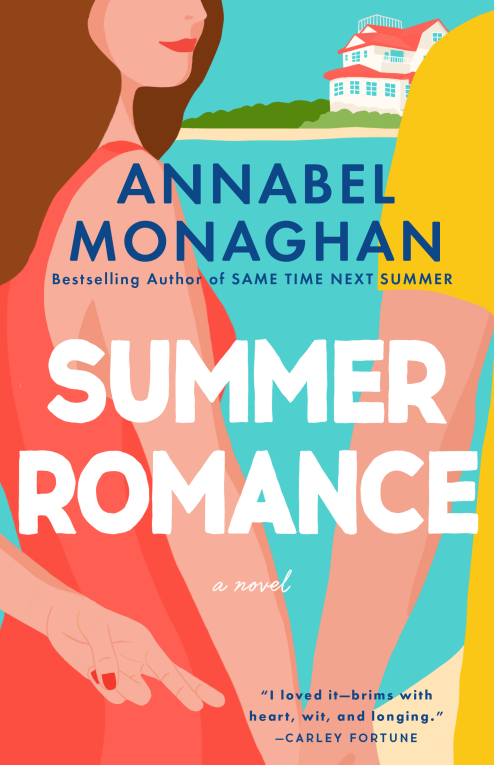 Ali can organize anyone else's life, but even opening her own mail proves much more difficult. Why is that?
Ali can organize anyone else's life, but even opening her own mail proves much more difficult. Why is that?
I think this is really common. When my friends call me with a problem, I give them the best advice. It's so much easier to give someone else advice about their situation or their relationship, because you're not sitting in all those feelings. You're so connected to your own stuff--the stuff in your house, your emotional stuff--that sometimes you can't see your way out of it. I tried to move Ali through that process--getting rid of stuff, like her mother's soup tureen, that holds these expectations of the person she did not become.
Ali holds frequent one-sided conversations with her mother, Nancy, who died two years ago. Tell us about that.
My mom passed away when I was 39. We were very close: I spoke to her on the phone every single day. I ran everything by her. When she passed away, I was so sad. Then, about five years later, without her standing next to me, I started thinking about things differently. I started re-processing our relationship differently, from a distance.
Sometimes your parents have expectations of you. For example: my children are adults, and I have an expectation of how they should be spending their time that has nothing to do with how they're spending their time. I think we do this with our parents, our children, even our friends: we expect them to act a certain way. And there's the act of letting go of people you love, learning to say, Live your life exactly how you want to live it, and I'll love you anyway--rather than saying, Please redo everything to fulfill my dreams for you.
As she grieves her mother's death, Ali also realizes she wants to be a different mother than the mother she had.
At one point, Ali comforts her daughter Greer after a seventh-grade crisis, but chooses not to agree with her that it's the end of the world. This is a shift from how Ali's own mother parented her. Nancy just wanted to protect Ali from the pain. The truth is that as we move through this life, we're going to have lots of pain--disappointments and heartbreak and all that. If we always try to protect each other from the pain, we create a whole generation of people who are terrified of anything ever going wrong. What we need to do is sit with someone in their pain and acknowledge that it is hard, and that you will get to the other side, and you'll be all right.
This book wrestles with learning to let go: of our own expectations, of people we love, of other things. Can you talk about that?
So I just got my first dog five years ago. I didn't have a dog before that because I think it's crazy! You buy the dog, you fall in love with the dog, and you know the dog is going to die. The first week we had the dog, that's all I could think about. But what I learned is: if something's not going to last forever, the joy is still worth it. You might have a dog; you might befriend an elderly person, the way Ali befriends her neighbor Phyllis, and the joy is worth it. I think I've learned that over the last few years, and I definitely re-learned that while writing this book.
For years, Nancy and Ali would perform a wishing ritual at the beginning of summer. What would you wish for in your own "champagne summer" ritual?
I have a lot of transitions coming up this summer. I'm moving out of my house; my son's going to college; I'm launching this book. So my wish for this summer is not to race through it. I want moments of pause and stillness. --Katie Noah Gibson, blogger at Cakes, Tea and Dreams
Book Candy
Book Candy
"Handwritten 'draft' of Albert Camus's L'Étranger sold in Paris for €650,000 [about $705,000]," the Guardian reported.
---
"Indian Ocean Talks." Mental Floss featured "17 funny news headlines that make no sense."
---
"Behold the Codex Gigas (aka 'Devil's Bible'), the largest medieval manuscript in the world," courtesy of Open Culture.
Rediscover
Rediscover: T.D. Allman
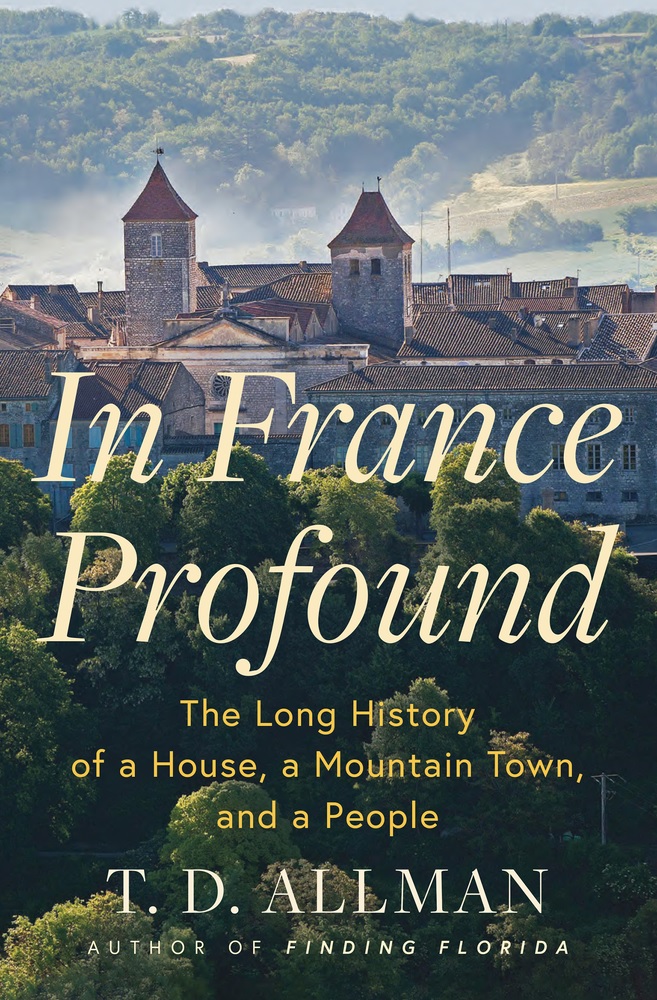 T.D. Allman, "a free-spirited journalist who challenged American mythmaking in pointed, personal reporting over five decades on topics as varied as the Vietnam War and contemporary Florida," died May 12 at age 79, the New York Times reported. His "colorful reporting from all over the globe--for Harper's, Vanity Fair, Rolling Stone, Esquire, National Geographic and other publications--combined close observation with sharp conclusions that often pointed the finger at U.S. misdeeds or at others abusing power."
T.D. Allman, "a free-spirited journalist who challenged American mythmaking in pointed, personal reporting over five decades on topics as varied as the Vietnam War and contemporary Florida," died May 12 at age 79, the New York Times reported. His "colorful reporting from all over the globe--for Harper's, Vanity Fair, Rolling Stone, Esquire, National Geographic and other publications--combined close observation with sharp conclusions that often pointed the finger at U.S. misdeeds or at others abusing power."
After graduating from Harvard in 1966, Allman joined the Peace Corps in order to avoid the Vietnam War draft. He broke his first big story in 1968 when he exposed the CIA's secret war against the Communists in Laos. His dispatches led to Congressional investigations in the U.S., and he went on to document the CIA's involvement in the overthrow of Prince Norodom Sihanouk in Cambodia, then helped rescue massacre victims there during the Pol Pot regime. He later was briefly kidnapped in Beirut and witnessed first-hand the events in Beijing's Tiananmen Square. As foreign correspondent for Vanity Fair, he interviewed the likes of Yasser Arafat, Boris Yeltsin, Helmut Kohl, and Manuel Antonio Noriega.
"Tim was good on the ground in dodgy republics as he covered their leaders like Arafat, Sihanouk and Qaddafi," former Vanity Fair editor Graydon Carter recalled. "He spent a good amount of time in Haiti, at which point we worried that we had lost him to the spirits down there. Regardless of the hardships, he always returned with rich, operatic epics that were memorable. And expensive."
Allman was also an author, writing books that focused on American foreign policy and on Florida, where he had been born. His first book, Unmanifest Destiny, critiquing America's approach to foreign policy, was published in 1984. It was followed by Miami: City of the Future (1987), Rogue State: America at War with the World (2004), and Finding Florida: The True History of the Sunshine State, which was published by Grove Atlantic in 2013 and longlisted for the National Book Award.
His last project, In France Profound: The Long History of a House, a Mountain Town, and a People, will be published this summer. It explores his house in the southwest of France, the village in which it is located and the deep connections he discovered there with France's past.
Grove Atlantic executive editor George Gibson said, "I feel honored and privileged to have worked with Timothy on In France Profound, which we will publish this August. As a writer, he could make connections nobody else would even imagine, and his prose has a special clarity. He would have relished bringing his beloved French mountain town of Lauzerte to life in the promotion of In France Profound, something we will now do in his honor."


